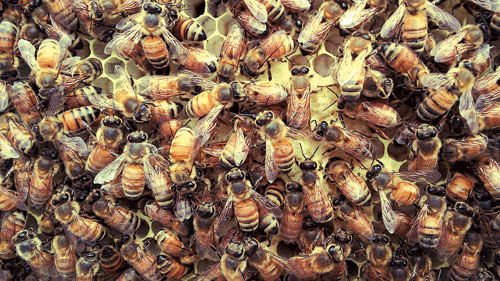POLLINATING WAYNEDALE ONE FLOWER AT A TIME
 Did you know that 16oz of honey requires 1,152 bees to travel 112,000 miles and visit 4.5 million flowers? Honeybees are often regarded as the hardest working animals on the planet. We depend on bees to not only produce honey but to do the majority of the pollination that plants require to grow the high yields of our food that we’re used to. But what if the honeybees didn’t exist? Even with all of the science that goes into growing crops, without bees plants would produce smaller fruit and in less abundance that would then come to our supermarket shelves at a higher cost to us as consumers.
Did you know that 16oz of honey requires 1,152 bees to travel 112,000 miles and visit 4.5 million flowers? Honeybees are often regarded as the hardest working animals on the planet. We depend on bees to not only produce honey but to do the majority of the pollination that plants require to grow the high yields of our food that we’re used to. But what if the honeybees didn’t exist? Even with all of the science that goes into growing crops, without bees plants would produce smaller fruit and in less abundance that would then come to our supermarket shelves at a higher cost to us as consumers.
It is true that we have honeybees to thank for the food we eat every day, but they might not be around forever. Since the 1990s, scientists and beekeepers alike have been concerned with the rapid decline of the bee population. Theories exist ranging from industrial agriculture, pesticides, global warming and parasites, but none can be sure exactly what causes this ‘colony collapse disorder.’
In response to this crisis, Alex Cornwell and Megan Ryan, donned their veils, slid on their gloves and built an apiary at the Southwest Conservation Club in Fort Wayne (Waynedale), Indiana. As an initiative to protect and conserve the local bee population, the Southwest Honey Co. was formed. Following the principles that the Southwest Conservation Club was founded on, the organization exists to promote true conservation, education of the outdoors and the restoration of wildlife. From their hives they plan to harvest local organic honey that will be sold as a fundraiser in support of the apiaries and the Southwest Conservation Club.
“As beginner beekeepers, we have been interested in helping the honeybees and harvesting honey to support the project ever since we watched a documentary on the problem, but have never actually done it until now,” Alex began.
Megan continued, “We read books, watched how-to’s on youtube.com and attended beekeeping association meetings. But the greatest support and advice came from other beekeepers, like Dave Shenefield, of Clover Blossom Honey, who encouraged us and answered our list of questions and who even gave us a tour of his 3,000+ hive company in La Fontaine, Indiana.”
With a great nervousness and anticipation Megan and Alex’s first ‘package’ of 10,000 honeybees were introduced to each of the hives on March 31, 2015. “It went pretty well and wasn’t as intimidating as we had expected. By the end of getting the bees into the hives we couldn’t wait to come back and check them,” Alex commented. They have been back to check or feed them five times since and they video recorded each ‘hive check’ for their website, southwesthoney.com. The beekeepers use these videos to educate the public and other beginner beekeepers in the area on what it’s like and to learn about beekeeping along with them.
These beekeepers say, “They won’t have honey until the fall, if at all this year.” Of which the second year is the typical honey harvest time for start-up hives like the ones that they are cultivating. If you have never tried local honey, many people find that using local honey helps with the treatment of allergy symptoms and honey is a fantastic sweetener substitute to use in any recipe while cooking or baking. Beekeepers Alex and Megan encourage readers to “save the bees by checking out our website and by ‘liking’ our Facebook page www.facebook.com/ southwesthoneyco for updates on our progress, a few corny bee jokes, and some great recipes using honey.”
- Celebrating 20 Years Of Community At The Stand - April 12, 2024
- First Positive Case Of Chronic Wasting Disease In Indiana - April 12, 2024
- Southwest Allen County Schools Embark On Major Tree Plantings - April 12, 2024


